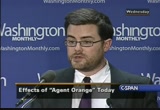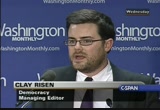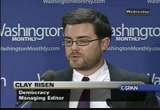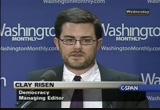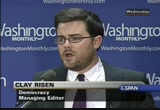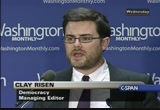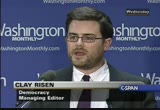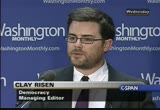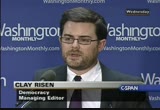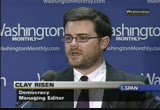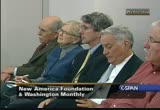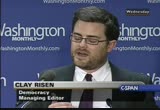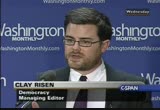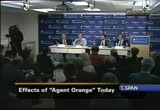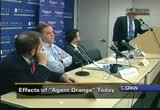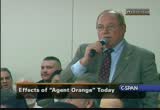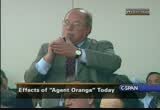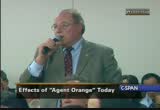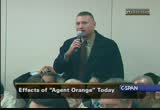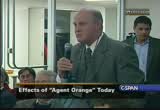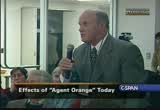tv C-SPAN Weekend CSPAN January 10, 2010 6:00am-7:00am EST
6:00 am
countries are in this category so the philippines until 1991 was home to the when the u.s. pulled out, it was discovered that we had, over the course of, you know, several decades, laid enormous environmental waste to the countryside. there was never a working sewer system at the bases, and so the result was just decades and decades of human and animal waste accumulating in the ground and in the water around there. however, for what it's worth, the philippines, the government , after world war ii, had signed a status of forces agreement that said it would take care of any of the side effects of u.s. action. the u.s. also said, look, you know, when we're pulling out in the 1990's and we're cognizant of these problems, these veermental problems, we can't
6:01 am
really hold ourselves responsible for actions that were begun at a time when no one in the world really considered the veermental consequences of this kind of activity. so we're not going to put ourselves in a position where we're suddenly responsible for actions that were taken under a different sort of paradigm, or different mindset. ultimate it will comes down to a question of cost. if you were to require the united states or any country really to clean up after its military activity overseas, there really would be no end to what can be required of them. of them. the u.s. recently paid 100 million -- about ten years ago paid not $100 million to canada to clean up to relatively minor facilities that we had up in the northern part of that
6:02 am
country, and that is an instance where the impacts and amount of damages were ultimately minor and we don't want to get into a situation where we are having to -- we i mean the u.s. military, not obviously myself -- where the military is having to check itself and spend an inordinate amount of time keeping its activities limited or somehow above board environment and therefore possibly do that, possibly not doing as much as it can to fulfill its mission. that is its perspective and the perspective of people in the government i spoke with for the article. now, all of that being said -- and you have these two categories around which there is no corpus of international law we had no motivation normal momentum toward the development of a corpus of international law we. there are -- there is yet another category where there has been some movement and that is
6:03 am
on the sort of political motivations for cleanup and there's one great example and when i discuss at length in the article and is something that could provide a framework for thinking about u.s. actions, visa v. the imam and that is japanese cleanup of chemical weapons left behind by the imperial army northeast china, so when the military forces of japan or withdrawing very hastily at the end of the war they left behind some 700,000 unexploded munitions, bombshells, what have you of all sorts. they had a whole range of chemical agents and most of them were buried, some of them were left in boggs and riverside's, not mere cities necessarily but over time as the population grew and people moved into these areas farmers started turning up
6:04 am
unexploded shells, construction crews would hit the shell and would go off for it would lead over time or over the last 60 years some hundreds of thousands of people have been affected and many of them have sustained life intact and injuries or have died because of this, so china long pressed for japan to do something about it. now until relatively recently japan has had no obligation to do anything. in the 1990's it signed the chemical weapons convention which required it not only -- which require signatories not only to get rid of their own chemical weapons but if they had ever left chemical weapons on the foreign soil to repeat the impact so again there were very few countries that actually fell under that category but one of them was japan. that being said, japan for a while did try to resist doing anything under this and they said we don't have an obligation, the sort of said it
6:05 am
is politically very difficult to do anything. you see the far right in japan has all of power and they don't want to take responsibility for anything but we did in china but one thing changed over the course of the late 80's into the 90's and that is the relationship between the two countries has changed. suddenly japan is not as powerful as it used to be and china is much more powerful economically, geopolitically the two of them now have -- the two are now each other's perhaps most important neighbor, and so japan now sees a political need in the economic need to make nice with china. now there are certain things that japan will probably take a long time to do in this regard. they will probably never apologize for invading china for a civil there's certain things the japanese decided in the 90's we can do. we left these chemical weapons behind we can address that we
6:06 am
obviously know china something for that and here is an easy way to address this question and therefore improve relationship with china japan did not a 180 but 130 and began to move toward an agreement, a joint effort with china since 1997 japan has piled millions and millions of dollars into this effort. things haven't gone as swimmingly as it was predicted. it's a very difficult thing to do. this is -- there's never been an effort on this scale before. the chinese government is somewhat difficult to deal with when you are moving a large inexplicably technical machinery into their country, and there has also been corruption on the japanese side. nevertheless, the political will behind this effort has been --
6:07 am
has been quite striking. but the point as the political will came about not because there was a moral obligation or because the legal groundwork changed but simply because the political environment changed, and there's also an interesting parallel not merely of the same size regarding the u.s.. having said all this about the u.s. never wanting to take account of its environmental transgressions overseas there is an interesting comparison to the way we've addressed this question with regards to canada as i mentioned, and in panama. in panama we had bases in the canal for almost 100 years, and during world war ii we used some of those bases testing areas mostly highlands off the coast to test chemical weapons. the idea being that the japanese might use chemical weapons against us in the south pacific or we might have to use them
6:08 am
against the japanese, and there is no understanding of what would be like in dutch arbuckle environment. we have control of these islands. we will test weapons there. not all of them went off. there are to this day and accounted for a number of chemical weapons sitting on a few islands off the coast of panama. the u.s. has offered in addition to the kind of bear minimum cleanup that it did after it pulled out of luck canal zone in 1999 we have offered a miner's son of money i think a couple of million dollars to help them clean up these facilities but our position has been what are you asking for you want to go in and clean up unpopulated islet and destroy to get to these weapons you will clean them up and then the result will
6:09 am
actually be worse as a few -- as opposed to leaving them alone to our response has been a deal with it, and here is some hush money. compare that with our efforts -- our cleanup efforts in canada. as i mentioned a couple of relatively minor small facilities in canada that we pulled out of after the end of the cold war canada said we have -- as we know we promised to clean this up but you guys a loss $100 million to take care of this and we are not going to do this on our own and besides we are your biggest trading partner and next door neighbor, come on to use a surprisingly riyal polity came to the floor in 1998 after a few years of saying no we don't do that kind of thing, the u.s. turned itself around and said, and this is according to john, deputy secretary defense of the time, there is no other country with the same combination of geography, historical relationship and vital significance to the u.s.
6:10 am
national security, he said and indicating yes we are going to take care of this, however he said this was a special case had not duplicated anywhere else in the world, so what's important to note is two things. first of all because we have this relationship with canada we decided to go against what is a pretty clearly stated policy and to go above and beyond the status of forces agreement we have with canada and take care of the problem. at the same time was very important was the ability for the u.s. to say this is a very special case. we are not going to do this for anyone else, and so that becomes kind of a very vague but useful framework for thinking about how do we -- how could the u.s. come around to doing something in the vietnam or what would be the requirement for the u.s. to do something because first of all there is never going to be a case where the i united states recognizes the moral obligation. it's proven time after time again that that is not a
6:11 am
criterion. the u.s. has no legal obligation, bilaterally or infringer -- international law. at the u.s. is quick to charge a high price or there is going to be a very high threshold for the u.s. to do something because of changing political and economic relations. however if there is a way to frame the assistance that is the limited, that is it makes it a special case where the u.s. can say very clearly we are doing this for you and we are not going to do it for anybody else, then you can start to see possibly i think if that were possible if you would start to see some action. and in fact that is what is happening in the case of the limited cleanup michael discussed. the u.s. has said we will give you this money but here's the deal: we are not doing it -- we are doing it for humanitarian
6:12 am
reasons which really means we are doing it just because well, we want to make you happy and everything but the conditions are we don't recognize the dioxin is a problem. we don't recognize there's dioxin in the area. we don't even recognize you have any need for this money but just in case you do it's a few million dollars and there you go. so that is the same kind of screening because the demand states is able or at least has the gumption to say this isn't a recognized problem but we will do it for you any way. we are then able to go ahead and do that. as we start to think about our talk about some of these issues addressed in the actual health consequences it will be useful for the policy makers to think about how can we from this kind of assistance in a way that is limited and tends toward an explanation of uniqueness and allows the united states and out which would prevent it from having to respond to similar
6:13 am
claims from other countries, line. that is an inordinately high bar. i don't think that there is -- you have to be very creative let's say to come up with a really compelling argument in that regard. but i do think that given the history of u.s. actions in this regard and the legal framework that is out there internationally that is it's going to be the only way forward. thank you. [applause] >> i should have introduced the democracy journal. now i would like to introduce philip longman of the new america's foundation. >> [inaudible] so i'm going to talk about the american veterans experience with agent orange, and before i do i just want to say right off
6:14 am
that despite my appearance and actually a little too young to have been in the vietnam war. i missed it by a year, so i say that so nobody will confuse me with a draft doctor or a vietnam veteran who's got attitude. if i go into a rage i'm doing it on behalf of veterans, not because i am one. the other somewhat complicating factor for me today is as paul mentioned i am the author of this book, "best care anywhere why the v.a. health care is better than yours." and i have ownership of that book. it's coming out in a second edition. i still stand by what it says, which essentially is the va, despite its mixed reputation, has undergone a quality revolution that has a lot to teach about reforming the rest of the health care system. thank you. but the va does have problems, and when it comes to agent orange, many of those problems are very revealed, and it's
6:15 am
interesting for even those who are not particularly interested in the subject. they reveal how other contradictions we carry around with us and how we think about health care, not just military by way of background, the united states didn't even have a v.a. or anything like it until after world war i. there was no presumption that if you had a kind of disability or combat-related problem that we would treat you. civil war, union veterans got pensions if they could prove a war-related disability. but we didn't have v.a. hospitals. the v.a. grew after world war ii into what is now the largest integrated healthcare service provider in the country. it's had a checkered history, particularly during the vietnam era, but has, as i say, undergone this great quality revolution in the 1990's to the point that if you take to most
6:16 am
vets today, the thing they're mad about with the v.a. is they can't get in. because we have this kind of crazy legacy that i don't think we've really thought about much because we just inherited it, that to this day we're not going to treat you as a veteran unless you're i understand gent or you have some service-related disability that you can prove. there are times when there were other exceptions, but that's essentially how the v.a. works. va works. now when we got out of the vietnam the guys started come back and explained to the complaint about things. basically we said well we will treat your at the but any other kind of complications you have we don't recognize that as having anything to do with your
6:17 am
being in the and on and it got ugly for those of you old enough to remember. there was a moment when carter's dac qtr remax cleveland was testifying in front of the senate's are probably a bunch of the imam war veterans and cleveland of course the people reject the through their medals and send you lost your walls and the vietnam, too. and there was riggins's va secretary who got on the "good morning america" and used the occasion to coffee and on veterans' a bunch of crybabies. there was gigantic lawsuits against dow and catv to makers of agent orange. it got settled in a way that left a lot of veterans feeling jipped. there were conservative think tanks that all kind of reports about how it is junk science that agent orange had anything to do with anybody's disabilities. and that went on for years until
6:18 am
finally 1991 looked like it got to the point we were going to do the right thing. so, past the law that year that said if you serve in the vietnam you have one of three conditions that are by then seceded with agent orange that would be a presumptive service disability and the va would treat you. then over the years on the same act called on the institute of medicine to every year review was science was out there and as the year went by the iom report come back and they keep finding more and more complications. the big one team in 1991 when they found a strong association with type two diabetes. of course one of the most common disease in american life and much more recently we've had new science on parkinson's. early onset parkinson's disease.
6:19 am
now, normally when it comes to public policy, you want it based on science. i mean, right? the last administration said they ignored signs and now we are all pro science. but in this realm, waiting for science is a real bad thing. it is on just for two reasons. number one, it simply takes time, and the enormous amounts of data to make a generalization about any association. so we have been waiting for the army to die before this definitive science comes in. the other thing is also when you think that the va hospital you might think of a wounded warrior is coming back from iraq or afghanistan. there is only a small portion of the people being treated in the v.a. hospitals. the typical fee a hostile has 5% of people. recent combat effects. everybody else, middle age and
6:20 am
the problems are the problems of aging. chronic diseases mostly. some of them brought on and exasperated by speed, exposure to all kind of other hazards in vietnam. but in any particular individual case, it is impossible to look at them and say well okay, your parkinson's is caused by exposure to agent orange. a chronic disease is always caused by a combination of genetics, environmental factors, behavioral things. so, we are actually asking people to prove a metaphysical point that cannot be proved and we now have this gigantic appeals court system hearing 40,000 cases of people coming up and saying i've got this problem and i think it has something to do with my service and you are saying it doesn't and my lawyer says it does and the fight every single day. a typical case would be guys
6:21 am
54-years-old, finds his hearing is going. he thinks that's probably because of the artillery shells i was around in vietnam, he makes a claim for a hearing aid and they come back and said no i think it was following around the rock band in the 60's and there's a gigantic fight about who is responsible for this guy 's hearing loss. fortunately, there is a better way. what we need to do as a society is stalled trying to condition people's access to health care on the basis of their being qualified for a deserving. the access to health care because it is a right of citizenship and certainly right of military server citizenship. most of the vets today are
6:22 am
elderly or late middle-age because the pattern of the war. most are going to qualify for medicare any way. the va has excess capacity. soon it's going to have a lot more excess capacity. it is less the world war ii generation and the korean war passalong. it's also been a winning for a decade now has literally offering the best care anywhere on metrics ranging from patient satisfaction to the use of information technology, evidence based medicine. anybody remotely acquainted with the quality of literature on health care the last decade would know the va has the best care anywhere. also, although it is hard to get a card number it appears the cost per patient as compared to medicare is about two-thirds. so this is a triple winner. open up the va to the vets who can use the medicare entitlement
6:23 am
not only that, open it up to their wives, let them buy into the system. this now makes clinical sense but 8-year-old veteran scott more bdy with their wife, they have to take care of their tether to the coverage of the buttocks sense because every person of medicare and to the va you have saved about one third and patient satisfaction is an incredibly high. so, that is my case for what we have to do not just about the agent orange situation, but getting the veterans write in general. thank you. [applause] >> thank you, everyone, four-door remarks. i want to open up to questions from the audience an eminent but first i want to ask for myself, and the first is it seems like
6:24 am
both in vietnam and in the united states -- and this is the theme that emerges as we are doing our research and editing the package, when you run into is the limits of science when trying to craft public policy for foreign policy or domestic health policy. as philip said, one wants to condition benefits or base promises of benefits on some hard numbers and hard science. in the case of both vietnam and the veterans here you run into problems with that. this is more of an open-ended question to the staff but also
6:25 am
michael, is this something that congress, the leadership in congress or the administration is going to have to deal with and is it something that in and your interactions with the vietnamese they recognize, and i would also like you to talk about the point you made that they see a difference in how we treat our veterans, the promises we make and the science we argue shapes benefits to veterans and the way science is used in denying responsibility in vietnam. >> let me start with since it is the most recent one the last issue which is the difference in perception between u.s. veterans
6:26 am
and how they are treated versus how the u.s. government from the cnas perspective deals with the vietnamese nationals exposed to dioxide and filled made good points about the nature of care being provided to u.s. veterans and there is one category for example the blue water veterans for example under the way that it has been interpreted by the va today, veterans who served aboard ship off the coast of the vietnam are not eligible for agent orange benefits because they never put foot on soil in vietnam and that is how the va has interpreted the law we passed by congress. there are bills before congress right now to address the issue that would extend benefits to the blue water bets as well as air force which is interesting because in many cases the pilots were the ones who were spraying agent orange but they may not be
6:27 am
benefit -- beneficiaries of the agent orange program because they didn't touch the soil in the vietnam. if they flew off the coast. i don't know the numbers on that category, but it is an interesting concept. having said that as i was indicating the way it is generally work is if you served during a certain time frame in the theater and the mom and touch soil and had certain medical conditions as he said was identified by the institute of medicine as having sufficient scientific evidence that the disease may be attributable to exposures to dioxin and he did when i have to talk like that but that is what kind of frames out then that it may be extended to you under the program and that is where the science issue over time becomes a problem. inside vietnam, turning to that aspect, but my sense of it was is in many cases you're dealing with health practitioners. if they have a patient, somebody with a problem.
6:28 am
they want to treat the problem. they want to treat the issue and to a certain extent, they are not overly concerned exactly why that person has that medical condition and so to the medical practice servers i've met with, the people who provide care in vietnam that i met with were interested in providing humanitarian assistance where things can get problematic is when the u.s. money is involved, u.s. government money is involved, the money is earmarked through particular program to be utilized in a particular way for certain types of beneficiaries, and so you can run into a problem they have to try to attribute the medical condition to a particular cause so the u.s. funds can flow to those particular patients. there are ways that have been presented that can address that. for example do can deal with the presumption of the population of around the airport. we will provide medical services to people who live near the airport regardless of the nature
6:29 am
of the cause of the illness. it's just humanitarian assistance would provide to the area because they are identified as an effective population. so there are ways it is being addressed on both sides but it at times can be from what i -- from the conversations i have with people what can be very frustrating because you have a regulatory to provide assistance on the other. >> let me ask another question and that is especially the clay, as we conduct -- as we look to the future america is obviously involved in into sizable military endeavors and a lot of little ones around the globe we are now pulling out of some of the smaller bases in iraq consolidating into larger ones eventually those too will be handed over. are we going to see some of the
6:30 am
same problems in iraq and eventually afghanistan as we saw in vietnam and canada and so forth? >> beginning in the early 90's the u.s. actually, the military did begin to recognize the political dangers of inherent in the pollution and environmental damage becoming evident on the basis not only domestically but also abroad as we start to pull down our forces in asia and europe and so there were congressional hearings, there were -- more importantly there was steps taken within the military to say okay, going forward we are going to try to be little more careful about these things if only because that is what is expected of very publicly visible public institutions particularly something like the military
6:31 am
command when it comes to our activities overseas we don't want this to become the reason why, to know, the next country forces us to pull out. so that it does and to do a whole lot for basis that have been around for a long time. the damage is so a lot of the existing pieces in germany although they have been better maintained in some of the asian bases but say something like garcia, there are enormous amounts of damage that go back a long time and despite the new recognition of the need to be better stewards in the 90's that's just going to be there. when you apply that question to iraq or afghanistan, i think that you are going to see as we withdraw a better maintained facility in that regard.
6:32 am
with that said the reality is always going to be the same. the forces we deployed in iraq and afghanistan are not there to be environmental stewards first and foremost. that is bluntly what the military says, we are there to fight a war and is someone else's responsibility to take care of that. we will do the best we can but we are not going to sacrifice our cut corners to date and they also still have the same kind of status forces agreement with iraq and afghanistan that you saw before. so yes, i think you can expect to see better facilities being turned over were less polluted areas but there is still going to be problems and i wouldn't be surprised if down the road iraq raises the was questions and says we have seen a higher level of morality in a certain area and we think that is because xy
6:33 am
and z stored during the u.s. occupation so i do think this will continue to be an issue despite more attention being paid since the 90's. >> i would like to open up for questions but first i want to recognize walter isaacson and the audience, walter of the aspen institute and also leader of the effort to to marshal support behind recognizing the issue of vietnam and agent orange and a contributor to our special reports. thank you for being here, walter. some questions, the gentleman in the back right here. and please, wait until you get to the microphone, state your name and also your affiliation if any. >> my name is peter carpenter. i am a vietnam veteran who's heavily exposed to agent orange and as a consequence, was subsequently diagnosed with chronic leukemia. i was the first such veteran to
6:34 am
be granted benefits by the va. as a consequence of knowing both harvey feinberg at the institute of medicine and kip at the v.a. i was able to get them to go back and review the data, and i just wanted to thank the panelists and the organization here for the work think you're doing because for the last five or six years this has become a sort of forgotten issue. something that we thought we dealt with, and those of us who served are now getting to the age where we are increasingly vulnerable to the long-term effect of the agent orange exposure which we had. and it is only going to be because of the work of people like you that we don't forget about the people who served. thank you very much for what you've done. >> thank you. [applause] >> this gentleman right here. >> my name is david adelson and i'd like to congratulate mr. longman and his presentation and solution. i think it is reasonable.
6:35 am
i'm an attorney involved in these issues about 25 years. i was the legal director of the vietnam veterans, the co-director of the national veterans legal services program and i think your article needs background and expansion. the 91 act that came as a result of the litigation brought against the va challenging the fda's interpretation of the 1984 agent orange act. they were applying a cause and effect standard which wasn't intended by congress. it was overturned by the federal district court of california and the case has been ongoing the last 21 years. basically the gentleman you mentioned in your article, once parkinson's is concluded he is entitled retroactive payments from the first day that he applied, not the data regulations -- this has never been advertised publicly as its agent orange outreach is never
6:36 am
done publicly. the va is under legal obligation to do both and they have done neither, and i would just again congratulate you on your analysis. .. he fell in line because of the litigation and because of the lobbying efforts of vietnam veterans of america mostly at that time, but he fought it tooth and nail. that was the only correction i would add to your article. >> thank you for. that >> i'd be happy to talk about it more any time. >> there's a gentleman right here. >> of a question for mr. martin. $2,000 to test for dioxin, is that the real barrier? what if it was a $2 test and it continues out that people who thought they had it dent and other people -- what he wants the political implication for
6:37 am
that? >> as i indicated in my statement, the $2,000 figure was one that was cited to me by the vietnamese authorities. i do know that there are efforts afoot, the ford foundation are part of that, to make available to the vietnamese government test facilities that would lower the costs significantly. so there we can see another cooperative effort that's going on to try to address the issue. now, speculating about what would happen if, in a particular case, you would feent out that the tesh level is below what would be sufficient to indicate evidence that a particular illness malady, birth connect or whatnot is a kind of speculative type question that is difficult to answer. and in some ways, the question may not be whether or not on a case-by-case basis you can demonstrate that the illness is
6:38 am
attractable to exposure to agent orange n. some ways, as we were discussing in the case of the u.s. veterans, and to a certain extent from the vietnamese perspective about the people in vietnam who've been exposeded, the issue may be more about trying to address the health problems of the population at this time. population at this time. >> i made the it not better arm of america. not making clear his role with the court cases also would that act with an tom daschle, mcgovern a did try to stop it but -- stood in front of the train ended not let the compensation act go
6:39 am
through. so ted as a teenager survived the holocaust so there's not much he could contribute to scare him and so for that reason he was legislator of the year. but i do want to correct something. the perception is that american veterans and in fact, the problems have been addressed and in particular the families of birth defects, the biggest concern right now of the amount veterans is not in our kids but grandkids. not one week that goes by we did not have a young woman called the office and talk about the anomalies and her child and one thing to know is it due to exposure of vietnam? the institute of medicine process that we have in
6:40 am
place with the by the annual review is a passive process. they can only review original science done by somebody else. currently there is not a single scientific study of agent orange by nih, the cdc, ferc, virginia zero or by duty. if you don't have science to review he will not make progress. 95% of the articles reviewed in 2006 and 2008 by the institute of medicine were done overseas by north norwegian companies or other companies in europe for the far east. of the real question is not just for the vietnamese although we certainly would like to see that, it is also justice for american families that are still suffering.
6:41 am
so that the key is not just raising awareness that agent orange is still a problem having to do with it, but still a significant problem having to do with american veterans and their children and grandchildren. thank you. thank you all for your efforts. [applause] >> the gentleman in the far back. >> i am from veterans and military families for progress. thank you for your work on this issue. you mentioned max ast the director in the late '70s and pensioned things started to change in the '90s and i think that was due to jesse brown, clinton's administration the virginia secretary talking about the history of the a i think it is only been 20 years with a cabinet level agency and
6:42 am
today i was encouraged by the selection of retired generals shinseki i don't think there could be a better pick. i think it is significant for example, when president obama announced his new policy in afghanistan and he was included in a speech at west point*. my question is for feedback how to encourage you are in general for the future and this administration keep paying attention to the issue? >> >> i am a film maker. in 2008 we finished a film on a documentary film of the environmental consequences of war. we certainly look at the
6:43 am
vietnam situation. but right now i would like to think of the implications. you touched on this briefly, but we were interested in depleted uranium. we want to test something with that in the film and we were told there was absolutely no empirical evidence available to put a case for word to look at this in the film but in terms of the science that we gathered to test for this coming they were not really being conducted in a way that would give scion's a chance to say something about this. i think from the point* of view of the future of preventing some of these things it needs to be considered. >> i think clay could probably best address that. >> depleted uranium is an
6:44 am
issue that comes up all lot and is also an incredibly popular element in the munitions light tanks and take shells and artillery. there is a decided interest against pursuing that tough question. the issue is there is a lot of incidental information and lots of reyes nor increase of morbidity and disease rates were it was used and a lot of suspicion but not a lot of science. there are some studies that show a connection. but most people, even those who are skeptical on will say when they are honest the jury is still out. you could see in the future
6:45 am
they're becoming a body of evidence that shows the connection that this will become an incredibly important issue because not only did we use depleted uranium in the first gulf war but@@@@ we use it now in iraq and afghanistan. it's simply a question that -- a question for the future. and i hope that 20 years from now we're not having a very similar panel, but focusing on d.u., it could be the case. >> you may not have answered one of the gentleman's questions, and knowing it was whether -- probably best for phil -- the obama administration's appointments to the v.a. suggest a change in policy on these issues. policy on these issues.
6:46 am
>> i think it is a mixed picture early on to people who were previously promised benefits then taken away. but still an awful lot of people in the military cannot get in. but the veterans health administration took a licking but kept on ticking during the bush years in toward the end they did everything they could to reinvent the the a of 1979 by taking it away from people on the field. i think there are signs that the obama administration gets that but they also need
6:47 am
desperately to get the information technology to work on claims processing because that is something that is totally broken and stays broken. there is a big fire in st. louis in 1973 that destroyed a lot of service records. there is a cottage industry just going around helping to people establish they were in vietnam or even the military. the handoff from the military to the fda has been a problem. they are getting better at integrating their records but they are still not there. the threshold for what people categorize mental illness the changes from generation to generation of. i don't think the virginia
6:48 am
is entirely up all. one of the things that it is confronted with this record numbers of recent events coming back of wanting and meeting mental-health services. again, they are hiring every actress they can find the still with the traumatic head injury is partly not the science there what to do about it that much. but there are deficits but the last budget raises the the a by aa% which is pretty good. >> i want to get a quick fire ask maybe three questions all at once and will try to get the panel to respond. >> please keep your questions brief. >> my name is mary and i am
6:49 am
with a national organization on disability. one thain that has not come up today has been and let me back up, i had the opportunity to work on a paper funded by the ford foundation on agent orange issues and the impact on veterans and received assistance from david adelstein and rick white man who just stepped out. what i researched with this steadies and the squashing if you will which is a harsh word to say, this quashing of the science and the challenges placed on the methodology is. i am curious about comments from the team up there on that and how there have been statements about how science was done wrong and not just
6:50 am
wrong like a mistake but on purpose and how might that provide another avenue or a vehicle to come to terms with this situation here for our veterans and families? but also as it relates back to the folks from vietnam? >> another question. >> i am the chairman of that agent orange committee for the the apec have a couple of comments first for dr. martin in the presumptive issues when you say may be called from the institute of medicine and uses different levels of association and which shows the different levels of association and the secretary makes the determination of this presumptive are not. i want to point* that out.
6:51 am
most of the issues are limited or adequate associations or no association but not maybe calls. the other issue i have to speak on and maybe the panel could reflect if they have knowledge of this. of the agent orange active 91 the proof of the purging is the implementation. there were some requirements to conduct clinical studies and collect clinical data. there it was issues to determine if there were issues with veteran as of today if you go to the virginia and ask for how many veterans that served have parkinson's disease come if they cannot break it out. because they only collect data on the amount era veterans. and during the vietnam
6:52 am
point* they were in germany or somewhere else. they cannot break out the clinical data so they never complied with that part of the loss limit we have to wrap up. is there a question? >> has the panel looked at any of the of information of the implementation of that each and/or jack? >> >> the category of scientific research addressing the issue of scientific research and the comments is a few noted in my presentation i did highlight the need for continuing scientific research something the vietnamese currencies as necessary and to a certain extent you see some interest in that in the united states government. what is interesting the vietnamese population
6:53 am
themselves present the opportunity to do the research that would establish causality between the links between certain medical conditions there is a potential wedding between the two to do with the population here in the united states and of the population of the vietnam. there is a third group and i would feel remiss which is vietnamese nationals relocate inside the united states. it is often a group that is missed in this issue. they lived in a vietnam during that time and have been exposed to agent george and dioxin they may not be veterans and not eligible and that the government of vietnam may not welcome them if they nationalized in the united states and there is a sub population that may run into health problems that as of now we do not have a program that addresses their
6:54 am
needs. needs. >> on the subject ofíu know what i know of is from him. but one thing that just astounds me is that the aid does have a wonderful electronic medical record system that is held up around the world. and yet apparently it lacks a field in the program were you can injure served in vietnam between 1963 and 1972. it would take an effort to go back and do that but this is an organization it converted from a pure paper record system to the digital system sure the we can put that little record in. you may not be able to do it for every veteran but do it. bring it up to a size that
6:55 am
you can do with reasonable generalizations. they do this and other bells. take the drug that killed more americans than died in vietnam. vioxx. they could see the clusters of heart attacks and that is what they had been common and realized it was vioxx progress seems you could do a lot of population health and not worry about randomized testing and difficult issues and all of the other stuff you can do it fast and cheap and i don't know why we don't do it. >> i think we have dealt with all questions the merry not yours. the issue of operation ranch hand. michael i don't know it's if you are on top of it. we read your paper of this.
6:56 am
and whether if you have any insight into her question? >> i am not a health care professional. but may stipulate that. my understanding of doing studies is basically predicated on the methodology used and a lot of statistical techniques are very similar. for those of you who have looked over my report, there were indications that methodology may not have been followed in a very rigorous fashion. on earlier studies and having said that i can establish that. to a certain extent, my view is rather than focus on studies done a number of years ago, the issue as i tried to indicate earlier is looking ahead to studies that could be done, should be done to make the determination of medical conditions and with that in
6:57 am
mind i can see three readily identifiable populations of vietnam, vietnamese american population relocated in the united states and the war veterans. >> to wrap up one of the lessons of retek away from putting this together is what we have in vietnam now is a situation where a lot of the geostrategic interest are lined in the sense with the moral interest that there is a very good argument that for u.s. national security interest, we ought to to do right and deal with this that like canada and panama panama, vietnam is a country of increased importance and it is an issue that they care about.
6:58 am
we have a moral obligation even if it is not something we would act on simply as a moral obligation. it is a great question. is be a non important enough that it would likely spur us to take a very difficult steps politically to begin to do with the issue of humanitarian aid to vietnam. i want to thank everybody for coming and our piano and my partner and all things for helping to put this together. and also all of the folks here at the new america foundation and thank you for co [captioning performed by national captioning institute] [captions copyright national cable satellite corp. 2010]
6:59 am
>> you're watching c-span, created for you as a public service by america's cable companies. up next, it's "washington journal." at 10:00 eastern on "news makers," i.r.s. commissioner douglas shulman on how his organization is planning for the tax season and future changes for tax preparers. scomplaret, a look at thursday's stament by president obama on the attempted bombing of christmas day flight 253 from amsterdam to detroit. .
271 Views
IN COLLECTIONS
CSPAN Television Archive
Television Archive  Television Archive News Search Service
Television Archive News Search Service 
Uploaded by TV Archive on

 Live Music Archive
Live Music Archive Librivox Free Audio
Librivox Free Audio Metropolitan Museum
Metropolitan Museum Cleveland Museum of Art
Cleveland Museum of Art Internet Arcade
Internet Arcade Console Living Room
Console Living Room Books to Borrow
Books to Borrow Open Library
Open Library TV News
TV News Understanding 9/11
Understanding 9/11